Case Study: Cloud Storage System, Security and Auditing
VerifiedAdded on 2020/04/01
|5
|1140
|108
Case Study
AI Summary
This case study analyzes cloud storage systems, focusing on security, auditing, and data management. The paper begins with an abstract defining cloud storage and its benefits, such as efficient data access and cost reduction. It explores the principles of cloud computing, including resource pooling, virtualization, and elasticity. The study then examines three research papers. The first paper discusses a secure erasure code-based cloud storage system with proxy re-encryption. The second paper focuses on privacy-preserving public auditing for secure cloud storage. The third paper investigates a secure overlay cloud storage system with access control and assured deletion, highlighting the FADE system. The case study concludes by emphasizing the importance of cloud storage for efficient information processing and storage.
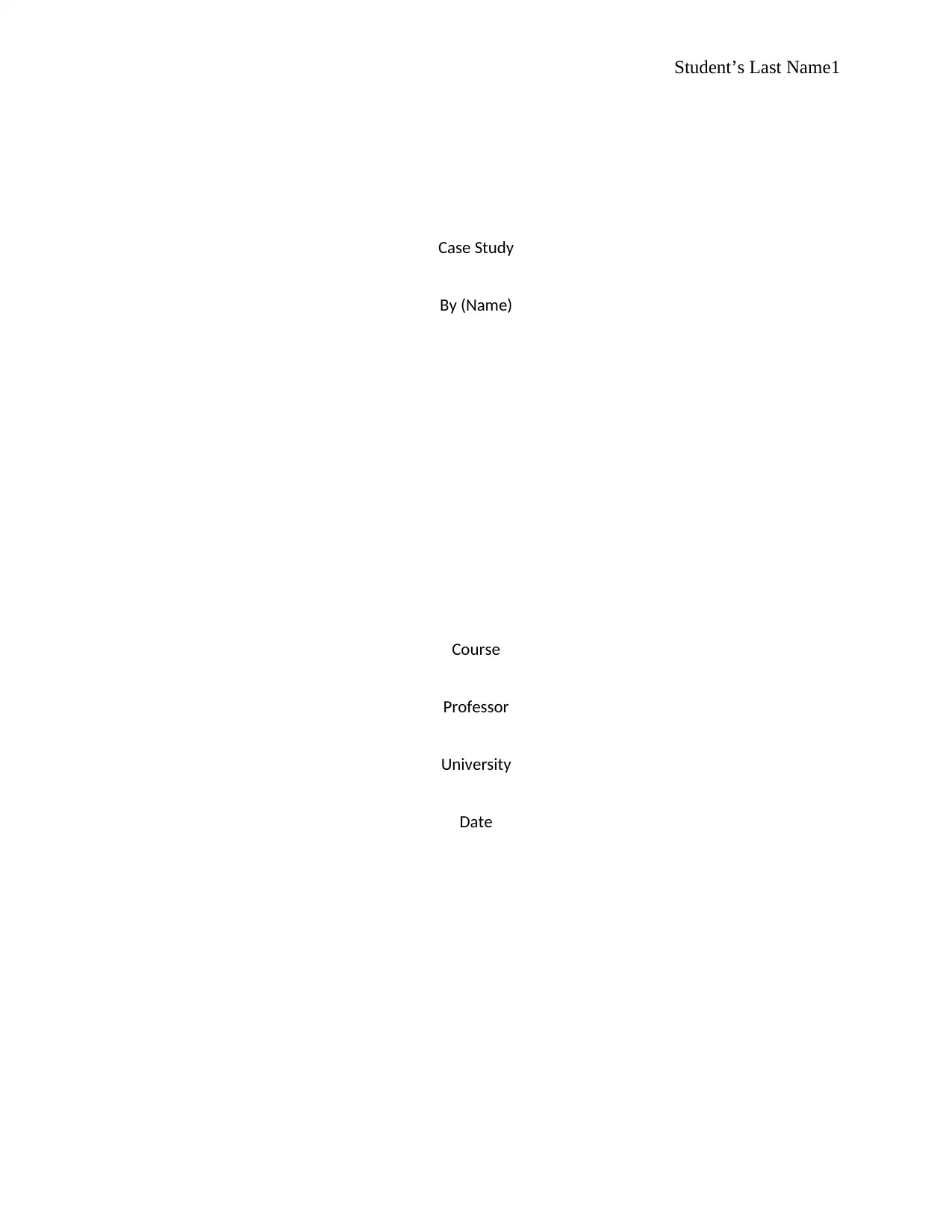
Student’s Last Name1
Case Study
By (Name)
Course
Professor
University
Date
Case Study
By (Name)
Course
Professor
University
Date
Paraphrase This Document
Need a fresh take? Get an instant paraphrase of this document with our AI Paraphraser
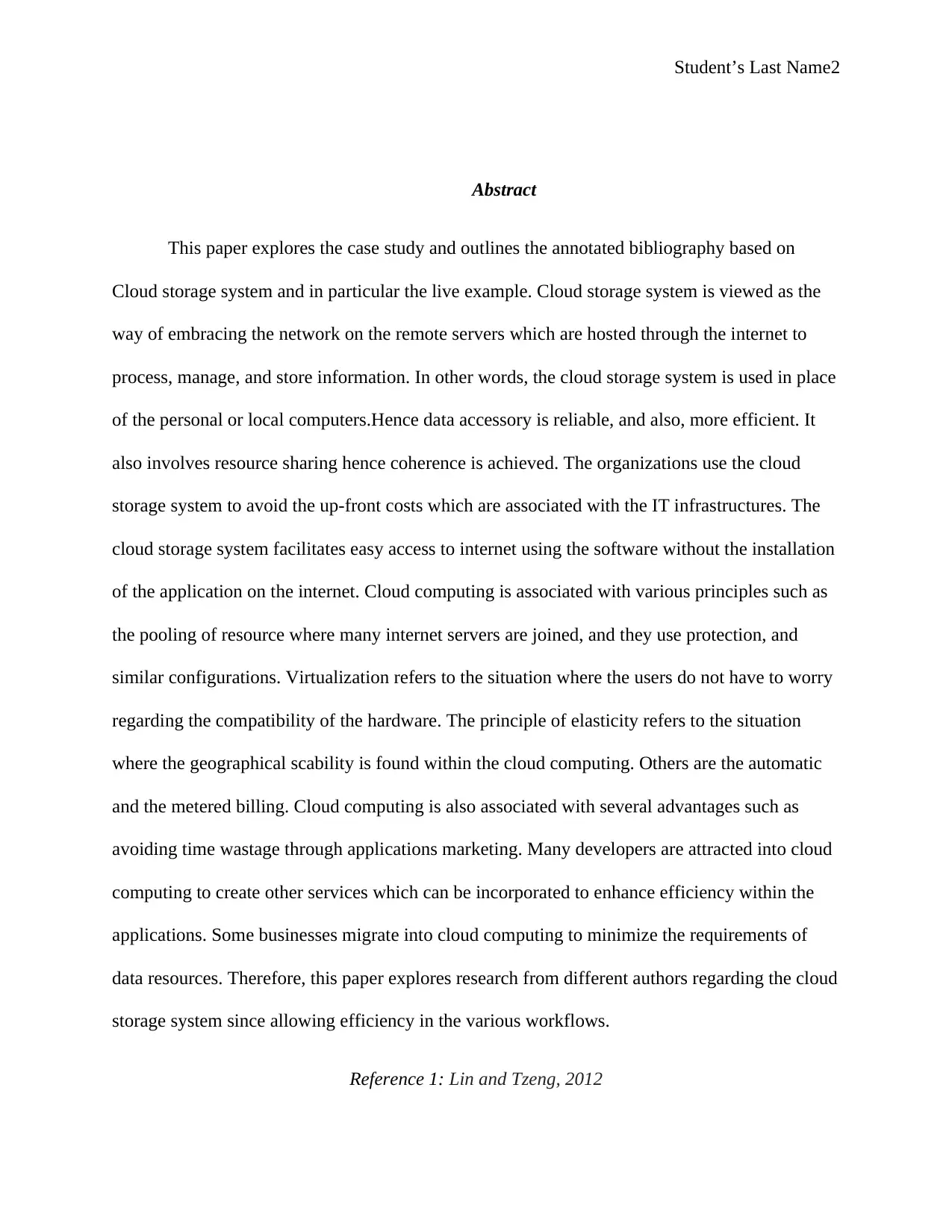
Student’s Last Name2
Abstract
This paper explores the case study and outlines the annotated bibliography based on
Cloud storage system and in particular the live example. Cloud storage system is viewed as the
way of embracing the network on the remote servers which are hosted through the internet to
process, manage, and store information. In other words, the cloud storage system is used in place
of the personal or local computers.Hence data accessory is reliable, and also, more efficient. It
also involves resource sharing hence coherence is achieved. The organizations use the cloud
storage system to avoid the up-front costs which are associated with the IT infrastructures. The
cloud storage system facilitates easy access to internet using the software without the installation
of the application on the internet. Cloud computing is associated with various principles such as
the pooling of resource where many internet servers are joined, and they use protection, and
similar configurations. Virtualization refers to the situation where the users do not have to worry
regarding the compatibility of the hardware. The principle of elasticity refers to the situation
where the geographical scability is found within the cloud computing. Others are the automatic
and the metered billing. Cloud computing is also associated with several advantages such as
avoiding time wastage through applications marketing. Many developers are attracted into cloud
computing to create other services which can be incorporated to enhance efficiency within the
applications. Some businesses migrate into cloud computing to minimize the requirements of
data resources. Therefore, this paper explores research from different authors regarding the cloud
storage system since allowing efficiency in the various workflows.
Reference 1: Lin and Tzeng, 2012
Abstract
This paper explores the case study and outlines the annotated bibliography based on
Cloud storage system and in particular the live example. Cloud storage system is viewed as the
way of embracing the network on the remote servers which are hosted through the internet to
process, manage, and store information. In other words, the cloud storage system is used in place
of the personal or local computers.Hence data accessory is reliable, and also, more efficient. It
also involves resource sharing hence coherence is achieved. The organizations use the cloud
storage system to avoid the up-front costs which are associated with the IT infrastructures. The
cloud storage system facilitates easy access to internet using the software without the installation
of the application on the internet. Cloud computing is associated with various principles such as
the pooling of resource where many internet servers are joined, and they use protection, and
similar configurations. Virtualization refers to the situation where the users do not have to worry
regarding the compatibility of the hardware. The principle of elasticity refers to the situation
where the geographical scability is found within the cloud computing. Others are the automatic
and the metered billing. Cloud computing is also associated with several advantages such as
avoiding time wastage through applications marketing. Many developers are attracted into cloud
computing to create other services which can be incorporated to enhance efficiency within the
applications. Some businesses migrate into cloud computing to minimize the requirements of
data resources. Therefore, this paper explores research from different authors regarding the cloud
storage system since allowing efficiency in the various workflows.
Reference 1: Lin and Tzeng, 2012
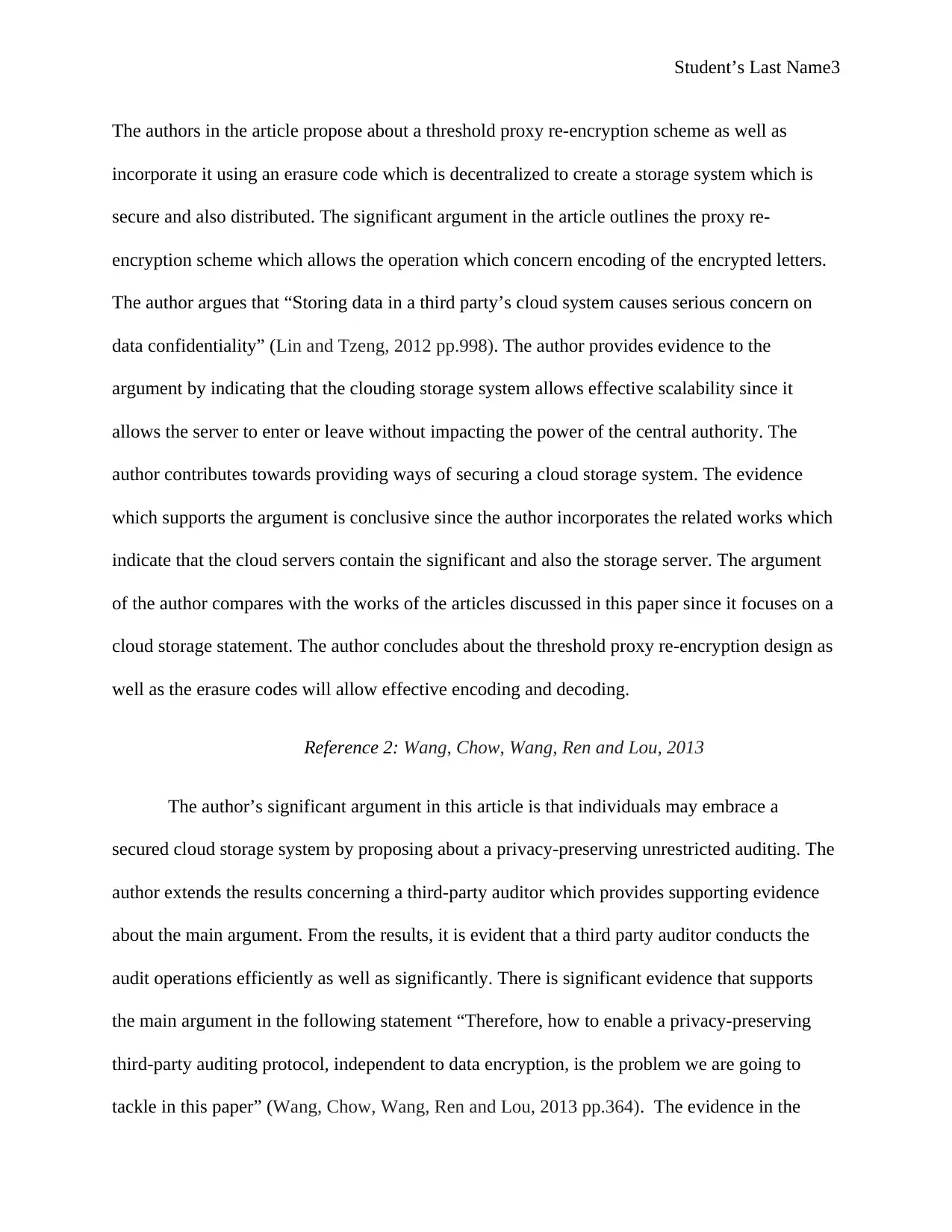
Student’s Last Name3
The authors in the article propose about a threshold proxy re-encryption scheme as well as
incorporate it using an erasure code which is decentralized to create a storage system which is
secure and also distributed. The significant argument in the article outlines the proxy re-
encryption scheme which allows the operation which concern encoding of the encrypted letters.
The author argues that “Storing data in a third party’s cloud system causes serious concern on
data confidentiality” (Lin and Tzeng, 2012 pp.998). The author provides evidence to the
argument by indicating that the clouding storage system allows effective scalability since it
allows the server to enter or leave without impacting the power of the central authority. The
author contributes towards providing ways of securing a cloud storage system. The evidence
which supports the argument is conclusive since the author incorporates the related works which
indicate that the cloud servers contain the significant and also the storage server. The argument
of the author compares with the works of the articles discussed in this paper since it focuses on a
cloud storage statement. The author concludes about the threshold proxy re-encryption design as
well as the erasure codes will allow effective encoding and decoding.
Reference 2: Wang, Chow, Wang, Ren and Lou, 2013
The author’s significant argument in this article is that individuals may embrace a
secured cloud storage system by proposing about a privacy-preserving unrestricted auditing. The
author extends the results concerning a third-party auditor which provides supporting evidence
about the main argument. From the results, it is evident that a third party auditor conducts the
audit operations efficiently as well as significantly. There is significant evidence that supports
the main argument in the following statement “Therefore, how to enable a privacy-preserving
third-party auditing protocol, independent to data encryption, is the problem we are going to
tackle in this paper” (Wang, Chow, Wang, Ren and Lou, 2013 pp.364). The evidence in the
The authors in the article propose about a threshold proxy re-encryption scheme as well as
incorporate it using an erasure code which is decentralized to create a storage system which is
secure and also distributed. The significant argument in the article outlines the proxy re-
encryption scheme which allows the operation which concern encoding of the encrypted letters.
The author argues that “Storing data in a third party’s cloud system causes serious concern on
data confidentiality” (Lin and Tzeng, 2012 pp.998). The author provides evidence to the
argument by indicating that the clouding storage system allows effective scalability since it
allows the server to enter or leave without impacting the power of the central authority. The
author contributes towards providing ways of securing a cloud storage system. The evidence
which supports the argument is conclusive since the author incorporates the related works which
indicate that the cloud servers contain the significant and also the storage server. The argument
of the author compares with the works of the articles discussed in this paper since it focuses on a
cloud storage statement. The author concludes about the threshold proxy re-encryption design as
well as the erasure codes will allow effective encoding and decoding.
Reference 2: Wang, Chow, Wang, Ren and Lou, 2013
The author’s significant argument in this article is that individuals may embrace a
secured cloud storage system by proposing about a privacy-preserving unrestricted auditing. The
author extends the results concerning a third-party auditor which provides supporting evidence
about the main argument. From the results, it is evident that a third party auditor conducts the
audit operations efficiently as well as significantly. There is significant evidence that supports
the main argument in the following statement “Therefore, how to enable a privacy-preserving
third-party auditing protocol, independent to data encryption, is the problem we are going to
tackle in this paper” (Wang, Chow, Wang, Ren and Lou, 2013 pp.364). The evidence in the
⊘ This is a preview!⊘
Do you want full access?
Subscribe today to unlock all pages.

Trusted by 1+ million students worldwide
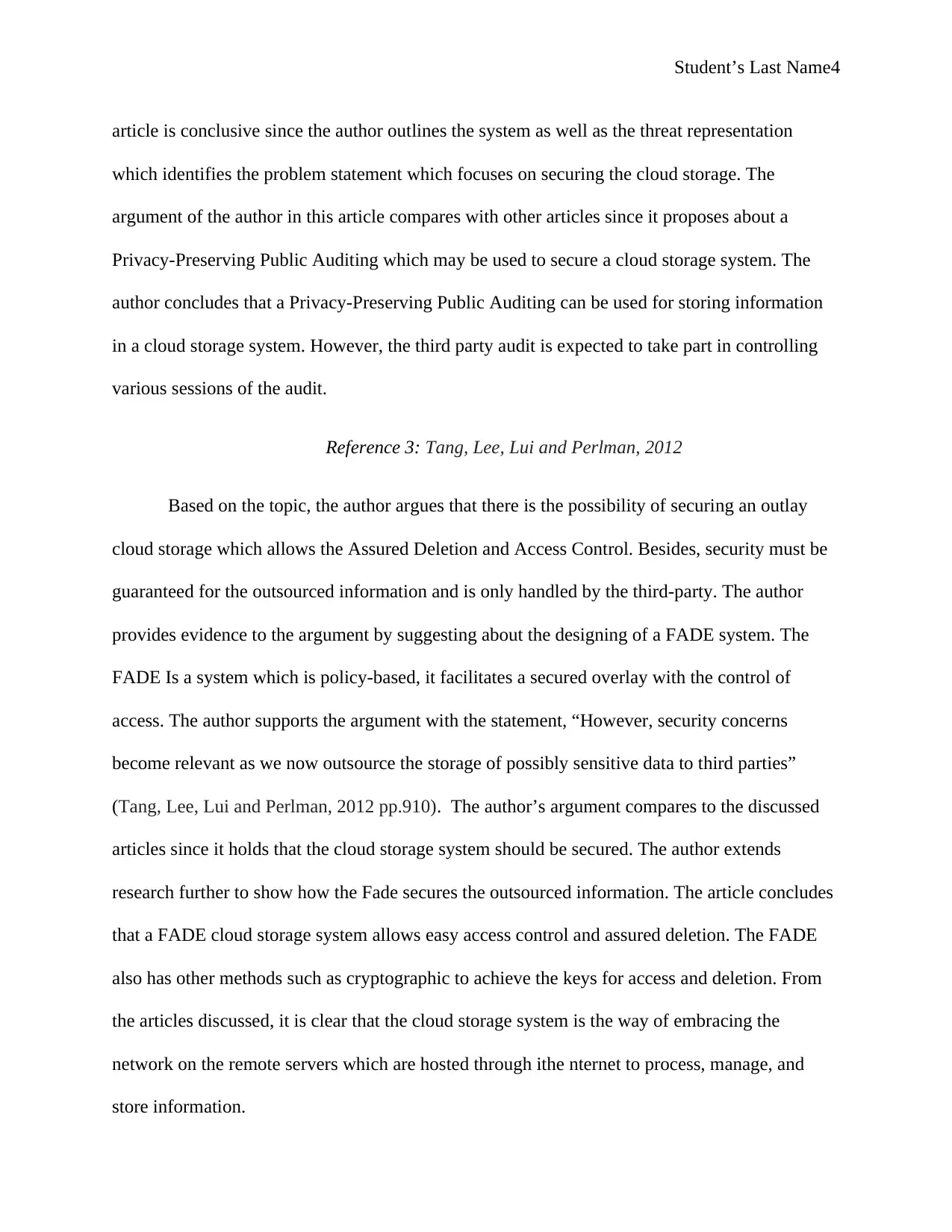
Student’s Last Name4
article is conclusive since the author outlines the system as well as the threat representation
which identifies the problem statement which focuses on securing the cloud storage. The
argument of the author in this article compares with other articles since it proposes about a
Privacy-Preserving Public Auditing which may be used to secure a cloud storage system. The
author concludes that a Privacy-Preserving Public Auditing can be used for storing information
in a cloud storage system. However, the third party audit is expected to take part in controlling
various sessions of the audit.
Reference 3: Tang, Lee, Lui and Perlman, 2012
Based on the topic, the author argues that there is the possibility of securing an outlay
cloud storage which allows the Assured Deletion and Access Control. Besides, security must be
guaranteed for the outsourced information and is only handled by the third-party. The author
provides evidence to the argument by suggesting about the designing of a FADE system. The
FADE Is a system which is policy-based, it facilitates a secured overlay with the control of
access. The author supports the argument with the statement, “However, security concerns
become relevant as we now outsource the storage of possibly sensitive data to third parties”
(Tang, Lee, Lui and Perlman, 2012 pp.910). The author’s argument compares to the discussed
articles since it holds that the cloud storage system should be secured. The author extends
research further to show how the Fade secures the outsourced information. The article concludes
that a FADE cloud storage system allows easy access control and assured deletion. The FADE
also has other methods such as cryptographic to achieve the keys for access and deletion. From
the articles discussed, it is clear that the cloud storage system is the way of embracing the
network on the remote servers which are hosted through ithe nternet to process, manage, and
store information.
article is conclusive since the author outlines the system as well as the threat representation
which identifies the problem statement which focuses on securing the cloud storage. The
argument of the author in this article compares with other articles since it proposes about a
Privacy-Preserving Public Auditing which may be used to secure a cloud storage system. The
author concludes that a Privacy-Preserving Public Auditing can be used for storing information
in a cloud storage system. However, the third party audit is expected to take part in controlling
various sessions of the audit.
Reference 3: Tang, Lee, Lui and Perlman, 2012
Based on the topic, the author argues that there is the possibility of securing an outlay
cloud storage which allows the Assured Deletion and Access Control. Besides, security must be
guaranteed for the outsourced information and is only handled by the third-party. The author
provides evidence to the argument by suggesting about the designing of a FADE system. The
FADE Is a system which is policy-based, it facilitates a secured overlay with the control of
access. The author supports the argument with the statement, “However, security concerns
become relevant as we now outsource the storage of possibly sensitive data to third parties”
(Tang, Lee, Lui and Perlman, 2012 pp.910). The author’s argument compares to the discussed
articles since it holds that the cloud storage system should be secured. The author extends
research further to show how the Fade secures the outsourced information. The article concludes
that a FADE cloud storage system allows easy access control and assured deletion. The FADE
also has other methods such as cryptographic to achieve the keys for access and deletion. From
the articles discussed, it is clear that the cloud storage system is the way of embracing the
network on the remote servers which are hosted through ithe nternet to process, manage, and
store information.
Paraphrase This Document
Need a fresh take? Get an instant paraphrase of this document with our AI Paraphraser
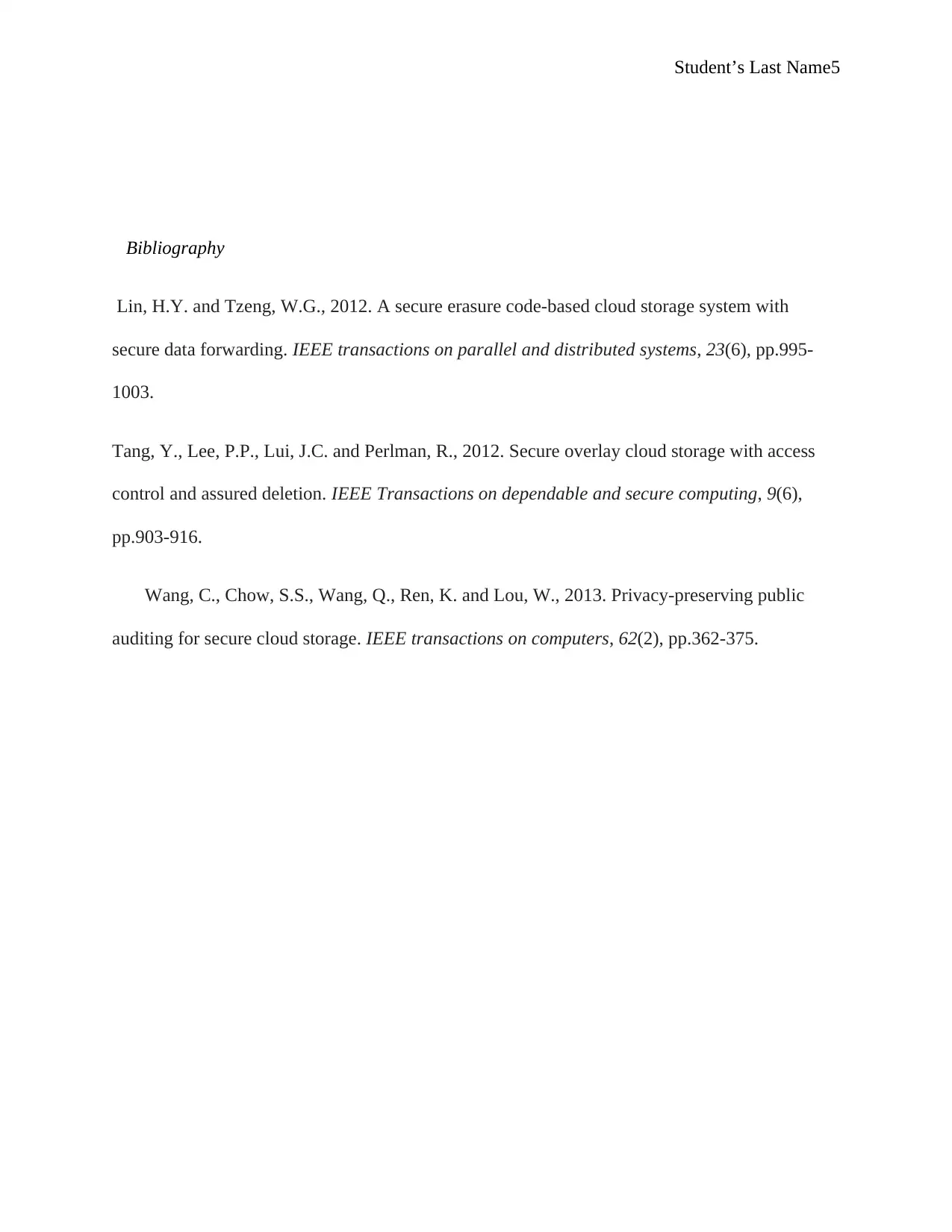
Student’s Last Name5
Bibliography
Lin, H.Y. and Tzeng, W.G., 2012. A secure erasure code-based cloud storage system with
secure data forwarding. IEEE transactions on parallel and distributed systems, 23(6), pp.995-
1003.
Tang, Y., Lee, P.P., Lui, J.C. and Perlman, R., 2012. Secure overlay cloud storage with access
control and assured deletion. IEEE Transactions on dependable and secure computing, 9(6),
pp.903-916.
Wang, C., Chow, S.S., Wang, Q., Ren, K. and Lou, W., 2013. Privacy-preserving public
auditing for secure cloud storage. IEEE transactions on computers, 62(2), pp.362-375.
Bibliography
Lin, H.Y. and Tzeng, W.G., 2012. A secure erasure code-based cloud storage system with
secure data forwarding. IEEE transactions on parallel and distributed systems, 23(6), pp.995-
1003.
Tang, Y., Lee, P.P., Lui, J.C. and Perlman, R., 2012. Secure overlay cloud storage with access
control and assured deletion. IEEE Transactions on dependable and secure computing, 9(6),
pp.903-916.
Wang, C., Chow, S.S., Wang, Q., Ren, K. and Lou, W., 2013. Privacy-preserving public
auditing for secure cloud storage. IEEE transactions on computers, 62(2), pp.362-375.
1 out of 5
Related Documents
Your All-in-One AI-Powered Toolkit for Academic Success.
+13062052269
info@desklib.com
Available 24*7 on WhatsApp / Email
![[object Object]](/_next/static/media/star-bottom.7253800d.svg)
Unlock your academic potential
Copyright © 2020–2026 A2Z Services. All Rights Reserved. Developed and managed by ZUCOL.




